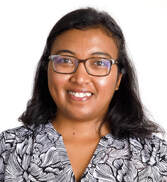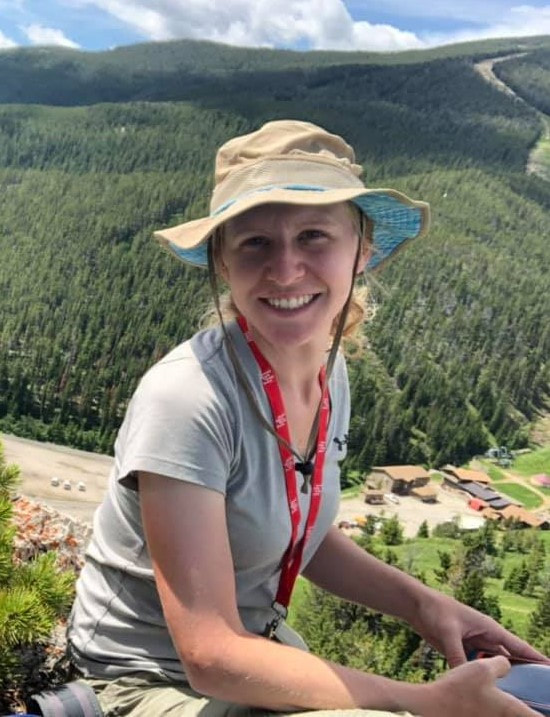Ny R. Voarintsoa
Principal Investigator
Postdoc
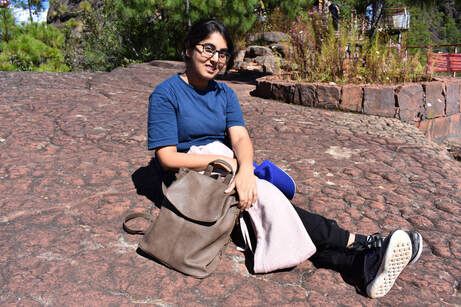 Dr. Sugandha Panwar,
Postdoc
Dr. Sugandha Panwar,
Postdoc
Sugandha Panwar is a postdoctoral fellow at the Department of Earth and Atmospheric Sciences at the University of Houston.
She earned PhD degree from IIT Roorkee, India, and was a postdoctoral researcher at Tongji University, in China. She uses geochemical techniques and methods along with sedimentology to study the sediment routing system, source to the sink, weathering dynamics, and organic carbon budget of the major river systems of the Himalayas and Tibetan region. Her recent focus is investigating past environmental changes and linkages between human actions and wildfire incidences in Madagascar.
Her publications include:
Panwar, S., Yang, S. (2022). Influence of Three Gorges Dam and Drought on Particulate Organic Carbon Flux and its Source in the Lower Yangtze River. Biogeochemistry, DOI: 10.1007/s10533-022-00889-w.
Khan, M.Y.A., *Panwar, S., Jie Wen (2022). Geochemistry of the Dissolved Load of the Ramganga River, Ganga Basin, India: Anthropogenic Impacts and Chemical Weathering. Frontiers in Environmental Science, DOI: 10.3389/fenvs.2022.823385.
Panwar, S., Yang, S., Srivastava, P., Khan, M.Y.A., Sangode, S., Chakrapani, G.J. (2020). Environmental Magnetic Characterization of the Alaknanda and Ramganga River Sediments, Ganga Basin, India. Catena 190, 104529.
For pastimes she like travelling, photography, cooking, and painting.
She earned PhD degree from IIT Roorkee, India, and was a postdoctoral researcher at Tongji University, in China. She uses geochemical techniques and methods along with sedimentology to study the sediment routing system, source to the sink, weathering dynamics, and organic carbon budget of the major river systems of the Himalayas and Tibetan region. Her recent focus is investigating past environmental changes and linkages between human actions and wildfire incidences in Madagascar.
Her publications include:
Panwar, S., Yang, S. (2022). Influence of Three Gorges Dam and Drought on Particulate Organic Carbon Flux and its Source in the Lower Yangtze River. Biogeochemistry, DOI: 10.1007/s10533-022-00889-w.
Khan, M.Y.A., *Panwar, S., Jie Wen (2022). Geochemistry of the Dissolved Load of the Ramganga River, Ganga Basin, India: Anthropogenic Impacts and Chemical Weathering. Frontiers in Environmental Science, DOI: 10.3389/fenvs.2022.823385.
Panwar, S., Yang, S., Srivastava, P., Khan, M.Y.A., Sangode, S., Chakrapani, G.J. (2020). Environmental Magnetic Characterization of the Alaknanda and Ramganga River Sediments, Ganga Basin, India. Catena 190, 104529.
For pastimes she like travelling, photography, cooking, and painting.
U of H Students
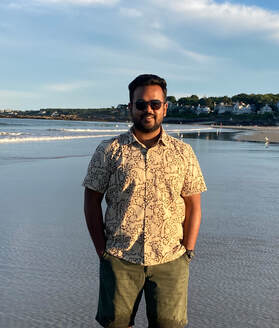
Arya Tilak is a PhD student in Geology at the Department of Earth and Atmospheric Sciences at the University of Houston.
Arya has a Master's degree in Geology from the University of Delhi, India. His MSc thesis research was about the paleoenvironment, paleobiogeography and inter-continental affinities of the vertebrate fauna in the Deccan Volcanic Province, India. He has a general interest in studying the complex interaction between anthropogenic and natural causes driving the Late Quaternary Extinction (LQE).
Before joining the PaleoGeochem lab, Arya gained experience in leading applied research for developing and disseminating an eco-friendly cement (LC3) in India, Thailand, Fiji and Malawi. He has contributed to working toward the Sustainable Development Goals (SDGs) during his previous research.
Outside of research and science, Arya likes to trek, travel, play cricket, write, and play the keyboard.
Arya has a Master's degree in Geology from the University of Delhi, India. His MSc thesis research was about the paleoenvironment, paleobiogeography and inter-continental affinities of the vertebrate fauna in the Deccan Volcanic Province, India. He has a general interest in studying the complex interaction between anthropogenic and natural causes driving the Late Quaternary Extinction (LQE).
Before joining the PaleoGeochem lab, Arya gained experience in leading applied research for developing and disseminating an eco-friendly cement (LC3) in India, Thailand, Fiji and Malawi. He has contributed to working toward the Sustainable Development Goals (SDGs) during his previous research.
Outside of research and science, Arya likes to trek, travel, play cricket, write, and play the keyboard.
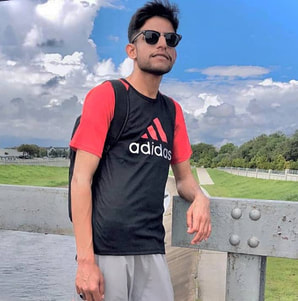
Ali Raza is a Ph.D. student at the Department of Earth & Atmospheric Sciences, University of Houston, Texas under the US-Pakistan Knowledge Corridor Ph.D. Scholarship Program.
He has completed a Bachelor of Science degree in Geology (2017) from the Department of Earth Sciences, University of Haripur, Pakistan. He was awarded the world's prestigious international scholarship, 'The Belt and Road MS Fellowship' for pursuing his Master’s degree in one of the top institutions in nature index of research-University of Chinese Academy of Sciences (UCAS). He earned his Master of Natural Science degree in Structural Geology (2021) from the College of Earth and Planetary Sciences, UCAS, Beijing, China. He is also an Individual Member of the Pakistan Association of Petroleum Geologists (PAPG) and Earth Explorer Club (EEC) for the year 2022-2023.
Ali is mainly interested in studying Paleoclimatic and Paleoenvironmental conditions/changes within sedimentary rocks with the aim to improve our understanding of depositional history, organic rich sequences, and economic zones, by using an integrated approach of field investigations, magnetic susceptibility, sedimentology, and trace element and isotopic geochemistry.
His geological interests are fairly broad, including paleoclimate and paleoenvironmental changes across a major geological boundary (i.e., K-T Boundary), microstructures in sedimentary rocks, geodynamic evolution of the Himalaya, and conventional and unconventional hydrocarbon reservoir characterization in foreland-fold and thrust belts.
Outside of research and science, Ali loves traveling- exploring different places, cultures, and traditions. He also likes photography.
He has completed a Bachelor of Science degree in Geology (2017) from the Department of Earth Sciences, University of Haripur, Pakistan. He was awarded the world's prestigious international scholarship, 'The Belt and Road MS Fellowship' for pursuing his Master’s degree in one of the top institutions in nature index of research-University of Chinese Academy of Sciences (UCAS). He earned his Master of Natural Science degree in Structural Geology (2021) from the College of Earth and Planetary Sciences, UCAS, Beijing, China. He is also an Individual Member of the Pakistan Association of Petroleum Geologists (PAPG) and Earth Explorer Club (EEC) for the year 2022-2023.
Ali is mainly interested in studying Paleoclimatic and Paleoenvironmental conditions/changes within sedimentary rocks with the aim to improve our understanding of depositional history, organic rich sequences, and economic zones, by using an integrated approach of field investigations, magnetic susceptibility, sedimentology, and trace element and isotopic geochemistry.
His geological interests are fairly broad, including paleoclimate and paleoenvironmental changes across a major geological boundary (i.e., K-T Boundary), microstructures in sedimentary rocks, geodynamic evolution of the Himalaya, and conventional and unconventional hydrocarbon reservoir characterization in foreland-fold and thrust belts.
Outside of research and science, Ali loves traveling- exploring different places, cultures, and traditions. He also likes photography.
|
Ariel Wilkie is a MSc. student at the Department of Earth and Atmospheric Sciences at the University of Houston. Ariel graduated with a bachelor of science in geology from the University of Houston in Fall 2019. During her undergraduate career, she was involved in research studying radiogenic isotopes from volcanic rocks in Big Bend with Dr. Brandon. In Fall 2021, she began her career as a masters student under Dr. Voarintsoa studying stalagmites, specifically at developing constrained laboratory experiments. Her research is focused on stable isotopes and trace elements to understand how these proxies are incorporated into stalagmites for improving our interpretation of stalagmites as paleoclimate archives. |
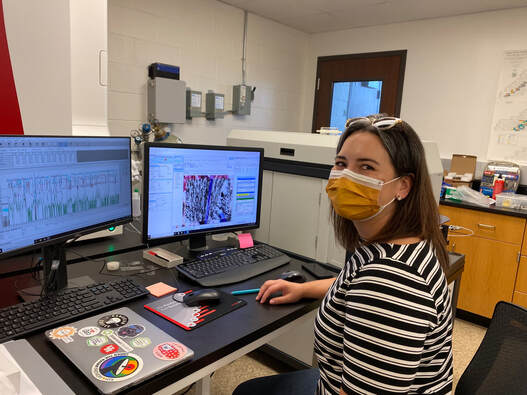
Hallie Fowler is a Geology, MSc. student at the Department of Earth and Atmospheric Sciences, University of Houston. Hallie graduated with a Geology, BS from the University of Houston in Spring 2019. In Fall 2019 she started her Geology, Msc. coursework, in Spring 2022 she joined the PaleoGeochem group and began studying stalagmites with Dr. Voarintsoa. Her research will be focused on developing LA-ICP-MS dataset from stalagmites to understand major and trace element variations.
Before joining the PaleoGeochem group Hallie worked as a Geology Technician and then subsequently as a Geologist specializing in Scanning Electron Microscopy at a geological services laboratory in Houston, TX.
Outside of research and science, Hallie enjoys archery, cooking, and being outdoors.
Before joining the PaleoGeochem group Hallie worked as a Geology Technician and then subsequently as a Geologist specializing in Scanning Electron Microscopy at a geological services laboratory in Houston, TX.
Outside of research and science, Hallie enjoys archery, cooking, and being outdoors.
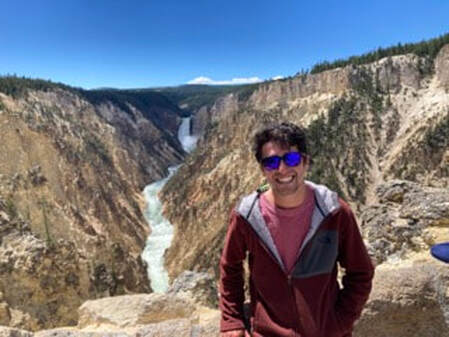
Gabriel Lopez
MSc. student
Gabriel Lopez is a MSc student in Geology at the Department of Earth and Atmospheric Sciences at the University of Houston.
Gabriel has a Bachelor of Science degree in Geology from the University of Houston. His MSc Thesis will focus on utilizing geological archives, such as speleothems, in conjunction with stable isotope proxies to reconstruct paleoclimate in tropical regions.
Before joining the lab, Gabriel gained experience in sedimentology/stratigraphy by preparing, running, and interpreting grainsize and grain-shape samples in a CILAS laser particle size analyzer in Dr. Wellner’s Lab. He additionally helped prepare and run sediment samples in a Germanium gamma spectrometer for radio-isotopic dating in the same lab. Gabriel has also gained experience in geochemistry by analyzing water samples utilizing LC/MS/MS instrument and performing solid-phase extraction of contaminant in liquid samples in Dr. Fu’s Lab.
Outside of research and science, Gabriel likes to play tennis, pickleball and guitar.
MSc. student
Gabriel Lopez is a MSc student in Geology at the Department of Earth and Atmospheric Sciences at the University of Houston.
Gabriel has a Bachelor of Science degree in Geology from the University of Houston. His MSc Thesis will focus on utilizing geological archives, such as speleothems, in conjunction with stable isotope proxies to reconstruct paleoclimate in tropical regions.
Before joining the lab, Gabriel gained experience in sedimentology/stratigraphy by preparing, running, and interpreting grainsize and grain-shape samples in a CILAS laser particle size analyzer in Dr. Wellner’s Lab. He additionally helped prepare and run sediment samples in a Germanium gamma spectrometer for radio-isotopic dating in the same lab. Gabriel has also gained experience in geochemistry by analyzing water samples utilizing LC/MS/MS instrument and performing solid-phase extraction of contaminant in liquid samples in Dr. Fu’s Lab.
Outside of research and science, Gabriel likes to play tennis, pickleball and guitar.
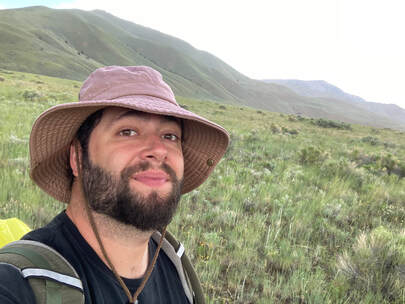
Daniel Ragusa
MSc. student
Daniel Ragusa is a MSc student in Geology at the Department of Earth and Atmospheric Sciences at the University of Houston.
Daniel has a Bachelor’s degree in Geology from the University of Houston. Daniel worked on few controlled experiment on dolomite precipitation with Dr. Voary during his undergraduate degree and has a broad interest in many geological topics. His current research is working to understand carbon sequestration and carbonation efficiency.
Outside of research and science, Daniel enjoys gardening, hiking, cooking, and playing chess.
MSc. student
Daniel Ragusa is a MSc student in Geology at the Department of Earth and Atmospheric Sciences at the University of Houston.
Daniel has a Bachelor’s degree in Geology from the University of Houston. Daniel worked on few controlled experiment on dolomite precipitation with Dr. Voary during his undergraduate degree and has a broad interest in many geological topics. His current research is working to understand carbon sequestration and carbonation efficiency.
Outside of research and science, Daniel enjoys gardening, hiking, cooking, and playing chess.
International Students
Antsa Lal’Aina Johanna Ratovonanahary, MSc. in progress, Univ. of Antananarivo, Madagascar. “Understanding cave responses to its surrounding environmental changes: a test for prior calcite precipitation via cave monitoring”. (Co-advised)
>>>> Awarded an Ikala STEM Research Grant
Joel Crusoé Tovonjanahary, MSc. June 2021, Univ. of Antananarivo, Madagascar. “Paleoenvironmental reconstruction using mineralogy and petrography of speleothems”. (Co-advised)
Avotriniaina Zafitafika Miandrisoa Rakotovao, MSc. December 2020, Univ. of Antananarivo, Madagascar. “Caractérisation et classification de l’environnement karstique de la grotte d’Anjohikipoty par couplage de méthodes géochimique et appui du SIG à la détermination des sites”. (Co-advised)
>>>> Received the Geological Society of Madagascar Presidential Thesis Award 2020
Elena Leclercq, MSc. June 2020, Department of Earth and Environmental Sciences, KU Leuven, Belgium “A multiproxy approach to reconstruct the paleo-environment in Madagascar using lake sediments”. (Co-advised)
Stellina Cynthia Andriatiana, MSc. June 2019, Univ. of Antananarivo, Madagascar. “Investigating groundwater and surface water quality in the urban site of Mahitsy of the Analamanga region, Central Madagascar”. (Co-advised)
>>>> Awarded an Ikala STEM Research Grant
Joel Crusoé Tovonjanahary, MSc. June 2021, Univ. of Antananarivo, Madagascar. “Paleoenvironmental reconstruction using mineralogy and petrography of speleothems”. (Co-advised)
Avotriniaina Zafitafika Miandrisoa Rakotovao, MSc. December 2020, Univ. of Antananarivo, Madagascar. “Caractérisation et classification de l’environnement karstique de la grotte d’Anjohikipoty par couplage de méthodes géochimique et appui du SIG à la détermination des sites”. (Co-advised)
>>>> Received the Geological Society of Madagascar Presidential Thesis Award 2020
Elena Leclercq, MSc. June 2020, Department of Earth and Environmental Sciences, KU Leuven, Belgium “A multiproxy approach to reconstruct the paleo-environment in Madagascar using lake sediments”. (Co-advised)
Stellina Cynthia Andriatiana, MSc. June 2019, Univ. of Antananarivo, Madagascar. “Investigating groundwater and surface water quality in the urban site of Mahitsy of the Analamanga region, Central Madagascar”. (Co-advised)
Copyright © 2015-2022 Ny Riavo Voarintsoa
